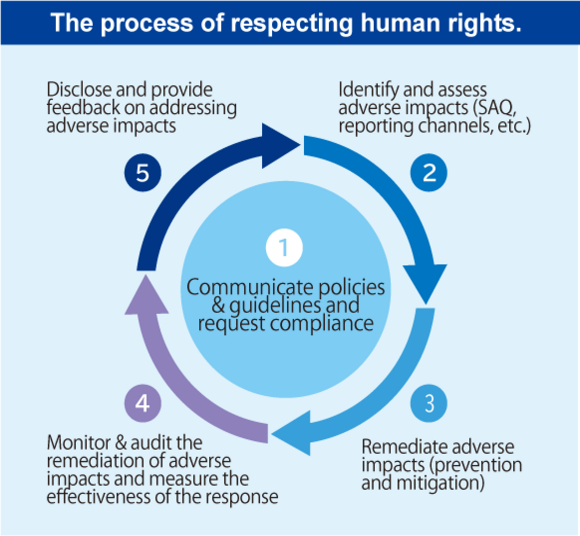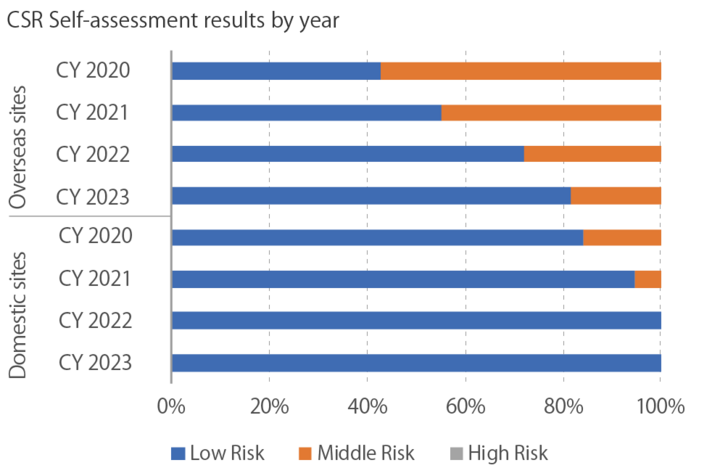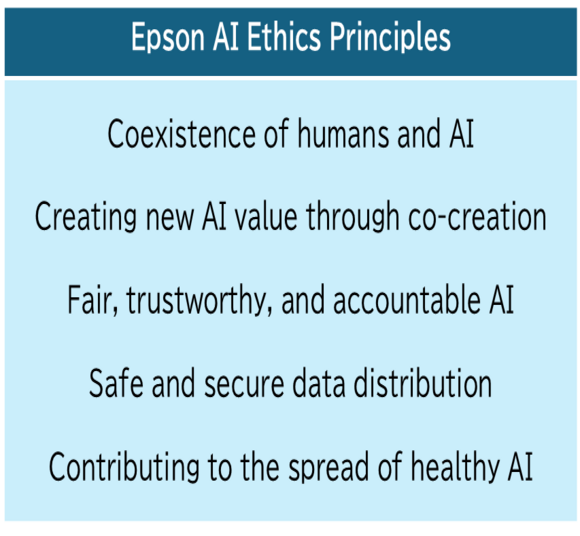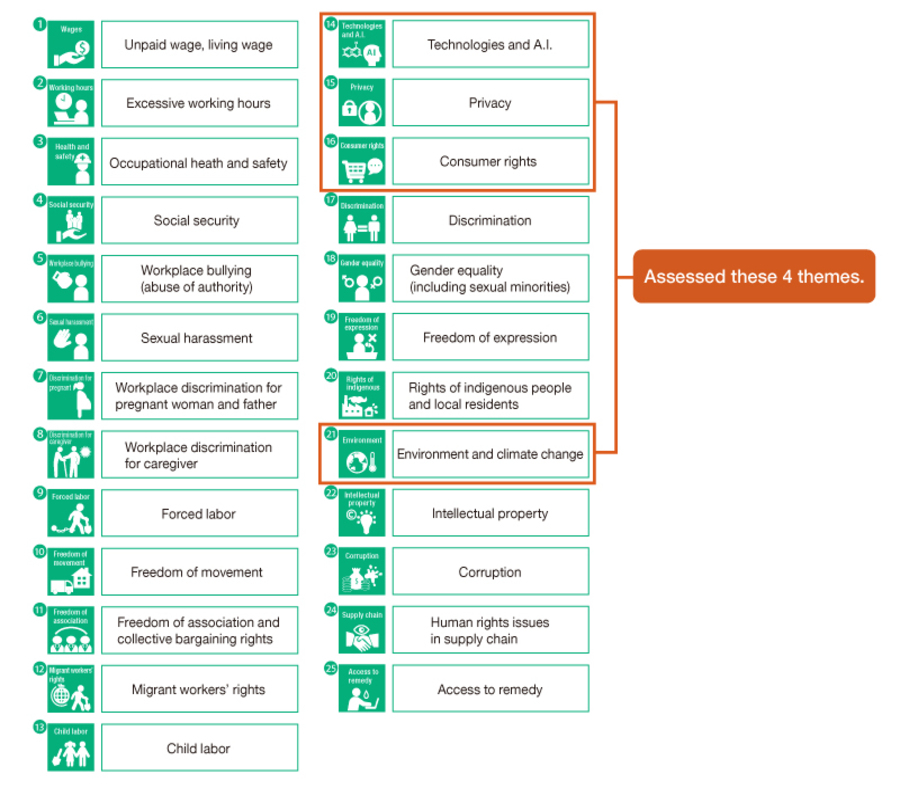Human Rights Due Diligence of Epson Group
Human Rights Due Diligence
Epson has established a process for respecting human rights in accordance with the United Nations Guiding Principles on Business and Human Rights (hereinafter referred to as the Guiding Principles). Epson has established the Epson Group Human Rights Policy, and is continuously implementing activities to identify and investigate adverse human rights impacts to extract problems and issues across the value chain, including group companies and business partners, to prevent and redress them. We monitor the results or progress of these prevention and redress activities on an as-needed and regular basis and report and disclose them appropriately internally and externally.

Concrete Actions
1. Human Rights Impact Assessment (Identification of adverse impacts) (Process of respect for human rights described above ②)[Guiding Principle 18]
In FY2023, we again conducted an impact assessment and identified adverse human rights impacts. The following information was referenced in the assessment
-
- Recognition and knowledge through the Responsible Business Alliance (RBA) activities over the past 4 years (CSR self-assessment and RBA audits)
- Status of occurrence, consultation, and reporting of internal and supply chain incidents
- Literatures such as Ministry of Economy, Trade and Industry's "Guidelines for Respecting Human Rights in Responsible Supply Chains, etc," and "Practical Reference Materials," and information obtained through participation in the Keizaijin Caux Roundtable Stakeholder Engagement Program, etc.
As a result, we have re-identified that the areas where human rights abuses are particularly severe and likely to occur at Epson are the labor and occupational health and safety issues listed in the table below related to Seiko Epson Corporation's employees, Epson Group company employees, agency workers, supplier employees, on-site service vendor workers, and migrant workers as well as Asia in terms of region and manufacturing in terms of business type. The "specific examples of particular concern" are listed by referring to the RBA Code of Conduct and past incidents within the Epson Group.
| High Priority Groups | Major Adverse Impacts | Specific Examples Requiring Particular Attention |
|---|---|---|
| Employees of Seiko Epson Corporation and Epson Group Temporary staff Supplier employees On-site service vendor workers Migrant workers |
Forced labor | - Intermediary fees, recruitment fees, and other expenses related to employment - Confiscation of passports - Forced overtime - Freedom to leave work or terminate employment |
| Young workers | - Overtime, night shifts, and work that jeopardise the health, safety or morals | |
| Overwork | - Violations of laws and internationally recognized human rights norms regarding working hours, and long working hours that are detrimental to health. | |
| Employee Welfare Programs | - Unpaid overtime wages - Non-payment or deductions from wages as a disciplinary measure |
|
| Inhuman treatment | - Harassment | |
| Discrimination | - Discrimination in dismissal and treatment - Pregnancy tests, dismissal of pregnant women |
|
| Occupational Health and Safety | -Hazardous and noxious working environment -Protection of female workers -Protection of workers in emergency situations |
2. Prevention and Mitigation of Adverse Impacts (Process of respect for human rights described above ③) [Guiding Principle 19]
Epson conducts CSR self-assessment annually in compliance with the RBA Code of Conduct and the survey form. After joining the RBA in April 2019, Epson is promoting activities to raise awareness of the RBA Code of Conduct to the Group, as well as conducts CSR self-assessment annually at Seiko Epson’s plants and offices, domestic and overseas Group companies, and major suppliers in compliance with the RBA survey form on an ongoing basis. The results of the CSR self-assessment survey are reported to the RBA. Each Seiko Epson plant and office, Group company, and supplier identify where adverse human rights impacts are located and develop corrective plans to redress and mitigate the identified adverse impacts.
Overview of 2024 CSR Self-Assessment (Epson Group locations)
| Topic | Description |
|---|---|
| Questionnaire |
RBA Self-Assessment Questionnaire (SAQ) - Facility Risk Questions - Facility Control Questions |
| Survey Contents |
RBA Code of Conduct Section A Labor Section B Health and Safety Section C Environment Section D Ethics Section E Management System |
| Implementation Period | Survey: April - June 2024 Identification of issues and corrective actions: July 2024-. |
| Target Locations | Seiko Epson business Locations 11 facilities Domestic affiliates: 8 companies (6 manufacturing companies and 2 sales and other companies) Overseas offices 45 companies (15 manufacturing subsidiaries and 30 sales and other companies) |
| Addressing Adverse Impacts | Develop a corrective action plan and work on redress and mitigation with the support and cooperation of the relevant headquarters departments in charge. |
Results for 2024 (summary)
In 2024, Seiko Epson conducted CSR self-assessment in accordance with the fully revised RBA SAQ.
The results of CSR self-assessment at each Seiko Epson facility, domestic affiliate, and overseas affiliate showed no high-risk *.
*High risk is defined as a score of less than 60 points.
The responses from each site were reviewed by the RBA supervisory department at the head office and the relevant supervisory department, and no issues that fall under priority non-conformances were found. In the process of the examination, we communicated with each site regarding any points of uncertainty and provided feedback to each site individually regarding areas that require correction.
There were two common issues at many of the sites that were not adequately addressed.
| Matter | Response |
|---|---|
| Reasonable accommodation for persons with disabilities | The head office supervisory department will disseminate guidelines to all sites on the meaning of this concept and the approach to dealing with it, and promote understanding of the concept. |
|
Conducting evacuation drills during the hours when it is dark outside |
The supervisory department at the head office is currently discussing with the department at the head office in charge of disaster prevention countermeasures about an announcement on the implementation of the drill. |
We will continue our efforts to further disseminate Group policies, Group regulations, rules and guidelines, etc. to each of our sites to ensure that the risk of serious human rights abuses continues to be controlled.
(Reference) The following table shows the results of CSR self-assessments (self-assessments in accordance with the RBA SAQ prior to revision) conducted by Epson Group companies from 2020 to 2023. The risk level is determined based on the score. We believe that the overall risk level has been decreasing year by year as a result of corrective actions taken each year.

* Low risk: Evaluation points are above 85, and actions are being taken overall at the level
required by the RBA Code of Conduct.
Medium-risk: Evaluation points are more than 65 and equal to or below 85, and there are items for which actions are not taken at the level required by the RBA Code of Conduct, and voluntary improvement is necessary.
High Risk: Items with a score of 65 or less, and items that do not meet the required level of the RBA Code of Conduct require improvement and monitoring of results.
Verification of Compliance with the RBA Code of Conduct (Mock Audit)
Seiko Epson has been conducting RBA's self-assessment for its main business locations, and now, in addition to that, we have conducted a compliance check (mock audit) by experts.
Outline of the mock audit
Implementation period December 2024
Implementation business Place Hirooka business Place (Nagano Prefecture)
Content and methods (document verification, on-site inspection, worker interviews) in accordance with RBA VAP audit standards
Auditor Third party qualified as an associate auditor of RBA
As a result of the mock audit, no serious adverse impacts on human rights were identified. However, some non-conformances with the RBA Code of Conduct were pointed out. As a member of the RBA, Seiko Epson is voluntarily addressing these non-conformances by formulating corrective action plans in consultation with the relevant departments. Progress on these initiatives is reported to management as needed.
3. Monitoring of Results and Progress (Process of respect for human rights described above ④) [Guiding Principle 20]
With the involvement of management, each facility, company, and supplier of Seiko Epson and its affiliates are working to redress or mitigate adverse human rights impacts per corrective plans. For serious adverse impacts, the relevant supervisory department at the headquarters confirms the completion of the remediation.
Epson continues to conduct the CSR self-assessment survey once a year to check the status of correction of non-compliance with the RBA Code of Conduct at each company and facility. Furthermore, seven of Epson's main manufacturing sites in Southeast Asia and China (as of May 2025) had voluntarily undergone RBA's Validated Assessment Program (VAP) audits on an ongoing basis to identify and correct issues from a third-party perspective and improve the level of their activities. To date, Epson has obtained the Platinum recognition, which is awarded when a company achieves a perfect score (200 points) with no RBA Code of Conduct nonconformities, at the production site in Indonesia, Malaysia, Thailand, China, and the Philippines.
The following are some of the major examples of adverse human rights impacts identified in FY2024 as a result of CSR assessment surveys or RBA VAP audits within the Group, which have been addressed or are being addressed on an ongoing basis.
| Adverse impacts | Place of Occurrence | Status of addressing |
|---|---|---|
| Delay in payment of wages to retirees | manufacturing company | Changed payment date in accordance with laws and regulations (within 3 days from the date of retirement) (system to be modified) |
| Failure to maintain safety equipment (eye washers) | manufacturing company | Replace with fixtures that meet legal requirements |
| Insufficient days of paid leave granted toformer dispatch worker | manufacturing company | The paid leave calculation method was revised in accordance with laws and regulations, and leave days were recalculated and granted. |
| Not testing drinking water (tap water) quality | manufacturing company | Inspection procedure was set in accordance with laws and regulations, and inspection was completed. |
| Failure to equip manufacturing machinery with safety devices | manufacturing company | Equipped with safety devices for such machines in accordance with laws and regulations |
In addition, adverse human rights impacts that have been addressed and provided for remediation include the following
| Adverse impacts | Place of Occurrence | Status of addressing |
|---|---|---|
| Long working hours by employees of business partners | Business partners | Discussed corrective measures with business partners, and actions have been taken. |
| Workers bear the recruitment fees | Business partners | Reimbursed |
| Violation of the Law concerning Worker Dispatching | Manufacturing company | Keep outsourced operations within the scope of the law. |
| Improvement of the emergency exit doors on the factory evacuation route | Manufacturing company | The structure of the relevant emergency exit doors has been reviewed. |
| Brokerage/recruitment fees to agencies paid by migrant workers | Manufacturing company | Stopped migrant workers' burden and reimbursed to workers |
| Custody of migrant workers’ passports | Manufacturing company | Thoroughly prohibit passports from being kept in custody |
| Agreement process with workers regarding overtime | Sales company | Clarification of the process for requesting overtime work |
| Advance payment by the applicant for the cost of medical examinations at the time of hiring | Manufacturing company | Reimbursed to the individual and changed to a process that does not require advance payment |
| Inadequate legal requirements in the contract between staffing agencies and the employees they dispatch | Staffing agency | Update the contract to comply with the law |
| Failure to record overtime work | Staffing agency | Payment of unpaid overtime wages and improvement of the overtime work record system |
| Errors in the calculation of the amount of withholding at source | Staffing agency | Adjustment of withholding tax payments, updating of calculation system |
| Failure to pay legal reserves related to employees | Business partners | Discussions and improvements have been made with the business partner. |
| Failure to manage working hours | Business partners | Discussions and improvements have been made with the business partner. |
| Failure to pay overtime wages by contractors performing services on premises | Business partners | Overtime wages have been paid in accordance with the local laws |
4. Communication and Reporting (Process of respect for human rights described above ⑤) [Guiding Principle 21]
The status of our efforts to address the issues requiring corrective actions is reviewed annually by the responsible manager and reported on our website and in our Sustainability Report. Global efforts of the Epson Group are reported in a statement on modern slavery and human trafficking.
To build and maintain good labor-management relations, Epson proactively provides information to employees and engages in sincere dialogue and discussions. Epson also communicates with customers about the status of Epson's efforts to respect human rights as needed.
Major initiatives undertaken in FY2024
Responding to Harassment by Customers
While there are legitimate complaints from customers requesting improvements regarding problems with products and services, there is a very small percentage of cases where requests or behavior that are inappropriate in light of social norms deny individuality or damage the dignity of the employees involved. These impede the continuous provision of services and lead to a deterioration in service quality.
Society's interest in this kind of customer harassment is growing. In fiscal 2024, Epson conducted a questionnaire survey and interviewed mainly with the sales and service divisions of Seiko Epson and its domestic affiliates. As a result, it was confirmed that some Epson employees were also victims of serious customer harassment, including adverse effects on the mind and body. In response to this, Epson has taken the following measures by referring to the "Manual for Company Measures against Customer Harassment" issued by the Ministry of Health, Labour and Welfare, and other sources.
・Epson established the "Epson Group Guidelines for Customer Harassment" (March 21, 2025) and disseminated them both internally and externally.
・In case we determine that any behavior constitutes customer harassment, we will take a firm stand against it. We may refuse to provide products or services or respond to customers.
In addition, if customer harassment continues, if it is malicious, or if it is judged that it violates criminal laws and regulations, we may deal with it in cooperation with the police, lawyers, etc.
・Employees who experience customer harassment are required to report it to their superiors and the organization takes action, and we have made it known that they can use the consultation desk.
・If necessary, we will give consideration to employees who have been affected, including mental care.
In addition, in order to prevent the Epson Group from causing harassment against its business partners, etc., we will reiterate and thoroughly inform Epson Group employees in harassment education and other activities.
*Please see below for information on the Epson domestic groups in scope.
Initiatives for AI Ethical Governance
At Epson, AI is increasingly being utilized in various ways, including integration into products and adoption in business operations. At present, we are anticipating risks including copyright infringement as unauthorized use of third-party copyrighted materials, leakage of confidential information belonging to Epson or others, and the generation or dissemination of incorrect information, inappropriate expressions, or biased and discriminatory content. To ensure the proper use of AI and address potential adverse impacts such as human rights abuses, Epson is taking the following measures.
Promotion System
Establishment of the AI Ethics Committee (July 2023)
Epson has established the AI Ethics Committee with the primary purpose of collecting and analyzing a wide range of information related to AI trends, making policy decisions, responding to AI-related laws and regulations in various countries, and building and operating a comprehensive AI ethics governance framework across the group. Members of the committee include representatives from departments such as technology development, quality assurance, legal affairs, and administration.
AI Ethics Management System/Promotion System
Each department appoints an AI Ethics Manager responsible for raising awareness of AI ethics, providing education, and conducting risk assessments for AI utilization projects.
Additionally, all affiliated companies, including those overseas, designate AI Ethics Officers who are responsible for establishing AI-related standards, reviewing and assessing risks in AI system utilization projects, and educating employees.
Through this structure, Epson promotes AI ethics governance on a global scale.
Policies and Regulations
Epson AI Ethical Principles (established on August 1, 2023, revised on April 1, 2025)
These principles define the standards Epson should uphold in promoting the research, development, operation, and utilization of AI, with the aim of realizing a human-centered society where humans and AI coexist.

Establishment of AI-related regulations and guidelines, etc.
To ensure the proper and ethical use of AI systems, Epson has developed and provided various internal rules and tools, including the AI Management Regulations, guidelines, checklists, and risk level assessment charts.
These policies apply across the entire Epson Group.
In response to the rapid spread of generative AI, Epson has also established the Generative AI Utilization Guidelines, which clearly outline considerations regarding copyright and privacy, as well as precautions for input and output.
These guidelines are designed to promote responsible and appropriate use of generative AI.
Operation
Epson manages AI systems using a "risk-based approach," in which the risk level of each AI system is assessed, and appropriate countermeasures are implemented based on the magnitude of the identified risks.
The AI Ethics Officer assesses and records the risk level for each AI utilization project.
In addition to copyright infringement and information leaks, Epson also checks for human rights violation risks from the perspective of consideration for social diversity and ensuring transparency and fairness.
If such risks are identified, we take measures to prevent or mitigate them.
Education
To deepen understanding of the importance of AI ethics and ensure the effective implementation of AI ethics management measures, Epson conducted e-learning on AI ethics in fiscal year 2024 for all employees, including those at domestic and overseas group companies.
In addition, e-learning programs have been provided specifically for employees who are involved in internal utilization of AI or the development and delivery of AI-related products and services.
Initiatives to Prevent Harassment
Epson recognizes that areas such as labor practices and occupational health and safety carry the highest risk of human rights abuses. In Japan, we are particularly committed to ongoing efforts to address harassment and continue to take proactive measures in this regard.
Initiatives undertaken in FY2023
Although Epson recognizes that labor practices and occupational health and safety are the areas with the highest risk of human rights abuses, in FY2023, we also conducted assessments in areas other than those. Specifically, we referred to the 25 categories presented by the Ministry of Justice as "areas of human rights that companies should respect," and selected eight of the following areas: “technology and AI”, “privacy”, “consumers’ rights”, “freedom of expression”, “rights of indigenous people and local residents”, “environment and climate change”, “intellectual property”, and “bribery and corruption”. After considering the degree of difficulty in remediability and the scale and scope of impact, and considering the relevance to Seiko Epson’s corporate activities, four themes were established: AI, privacy, consumers’ rights, and environment and climate change.
Areas of Human Rights that Companies Should Respect

Of the four issues the following were discussed with the relevant divisions: the possible adverse impacts of human rights in general; the potential adverse impacts at Epson; laws, regulations, and general mechanisms and frameworks for preventing, stopping, and mitigating adverse impacts; mechanisms and frameworks at Epson; whether or not Epson has a consultation/reporting windows for stakeholders; and whether or not actual consultations/reports have been made. As a result, we concluded that, although the use of AI, in particular, is currently limited within the company and no serious adverse impact has been observed, we have determined to continue monitoring it. This is because the technology is likely to develop dramatically in the future and have a significant impact on society, and secondly, because for Epson as well there are various possibilities for development, such as internal use and development of other businesses and incorporating it into products, and that these may have an impact on human rights. We will also continue to monitor the other three themes although no serious adverse impacts have been found to date.



